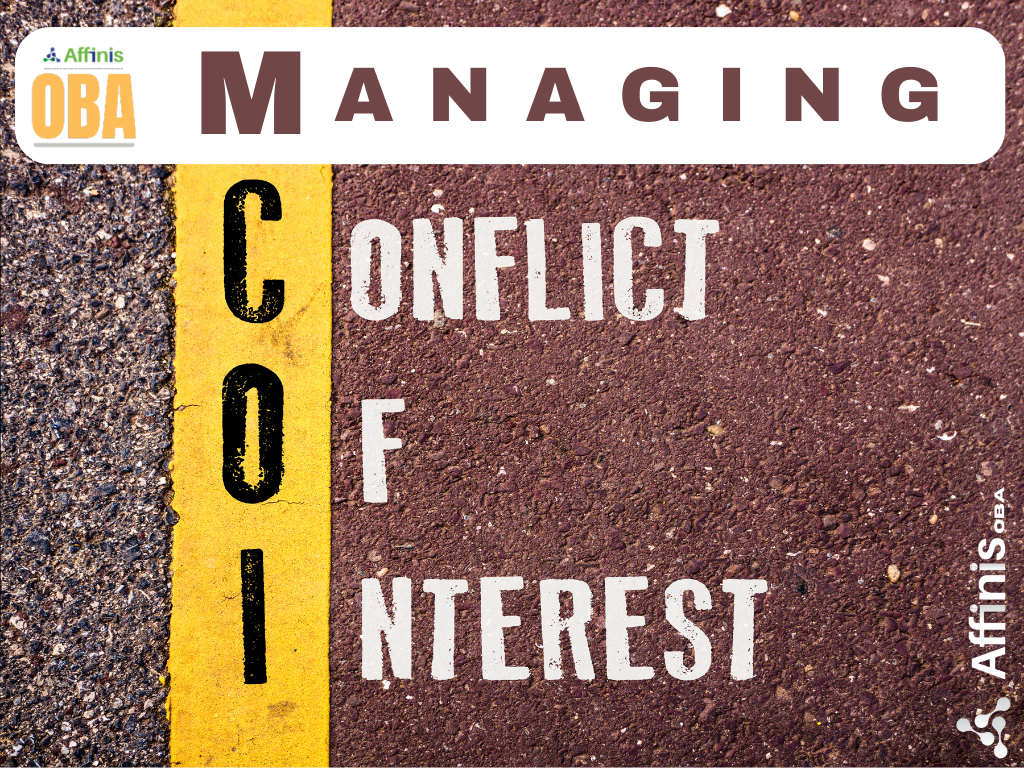Conflicts of interest are a common concern within the workplace, but they don’t always stop when you leave the office. Activities outside of your job can sometimes create ethical dilemmas or conflicts, even if they seem unrelated to your work responsibilities. Whether you’re involved in a second job, volunteering, or engaging in public speaking, these activities can intersect with your professional duties in ways that may not be immediately obvious. It’s important to recognize when these outside activities could pose a conflict and manage risks associated with them in a way that complies with company policies and maintains your professional integrity.
What are conflicts of interest?
To be sure, conflicts of interests are a wider term and can occur between the organization and its clients, between two clients of the same organization, between a client of an organization and its employees etc.
Here, we are particularly concerned with conflicts of interest that arise when an individual’s personal interests interfere with their professional obligations or decision-making. These conflicts can manifest both inside and outside the workplace. A typical workplace conflict of interest might involve having a personal stake in a business decision, but outside activities can be just as problematic.
For example, working a side job with a competitor, volunteering for a nonprofit that ranks your employer’s services, or speaking at a conference sponsored by a competitor can lead to a potential conflict. Even seemingly harmless activities like freelance writing, public speaking, or personal consulting can blur the lines between personal and professional interests and has the potential for significant conflict especially in the event of legal proceedings in the future where appearances can prove to be significantly misleading without the benefit of context.
Why outside conflicts of interest matter
While conflicts of interest are often discussed in the context of the workplace, outside activities matter just as much. These external engagements can affect your job performance, create divided loyalties, or even impact the organization’s reputation. Here’s why outside conflicts need to be managed carefully:
Undermining Trust
Outside activities have the potential to erode trust. They may impact the trust your employer enjoys with the external world or, in the alternative, may impact your employer’s trust in you. Or colleagues, clients, or employers might feel that your loyalty is divided, which could damage your professional relationships and the organization’s reputation.
Ethical Concerns
Engaging in activities that conflict with your job could raise ethical concerns. For example, volunteering in a field related to your job could be seen as a potential conflict, especially if there is any risk of confidential information being shared in either direction.
Legal or Financial Risks
Certain external activities could expose your company to legal or financial risks, especially if they involve sensitive information or trade secrets. For instance, writing articles or speaking at conferences related to your field might unintentionally disclose company strategies or proprietary knowledge.
Managing Conflicts of Interest Outside of Work
Properly managing conflicts of interest outside of work is essential to maintaining professional integrity and adhering to company guidelines. Most companies have specific guidelines for outside business activities which may include restrictions on second jobs, freelance work, or volunteer positions. Familiarizing yourself with these policies ensures that you stay compliant and avoid any potential conflicts. Organizations may have compliance management software that employees need to use to seek approval for outside activities.
Whether it’s second job compliance approval or volunteer work compliance approval regulations, seeking prior approval from your compliance officer is crucial to ensure helps ensure that your external engagements don’t interfere with your organization’s compliance obligations or your professional responsibilities.
Being transparent with your employer about any external activities helps build trust. Disclose any potential conflicts of interest, even if you believe there’s no harm. Open communication ensures that all parties are aware of the situation and can address any issues before they become significant problems.
Why employers care about outside conflicts of Interest
Employers are concerned about conflicts of interest outside of work because they can impact the company’s reputation, create ethical dilemmas, and potentially lead to legal issues not to mention impact productivity. Here’s why managing these conflicts is essential for both employees and employers:
Protecting Company Reputation
Companies have a vested interest in ensuring their employees aren’t engaged in activities that could harm their reputation or create negative publicity. For example, if an employee is found to have conflicting interests, it could tarnish the company’s image and hurt its relationship with clients, partners, or investors.
Ensuring Focus and Productivity
Employers also care about outside conflicts because they want to ensure that employees remain focused on their work. A second job or side business that takes too much time or energy can detract from an employee’s primary role, leading to decreased productivity and performance.
Regulatory Compliance
Depending on the industry, conflicts of interest can have serious legal implications. For instance, in the financial sector, employees are often required to disclose any external activities that could compromise their impartiality or violate industry regulations.
Conclusion
Conflicts of interest outside the workplace are just as important to manage as those within the office. Whether it’s a second job, volunteer work, or any other outside engagement, it’s crucial to ensure that these activities don’t interfere with your professional responsibilities, create ethical dilemmas, or cause harm to your employer’s reputation.
By understanding your company’s policies, seeking approval for any potentially conflicting activities, and maintaining transparency, you can manage your external interests while remaining fully compliant. Ultimately, balancing your personal pursuits with your professional obligations ensures that you uphold both your integrity and your employer’s trust.




